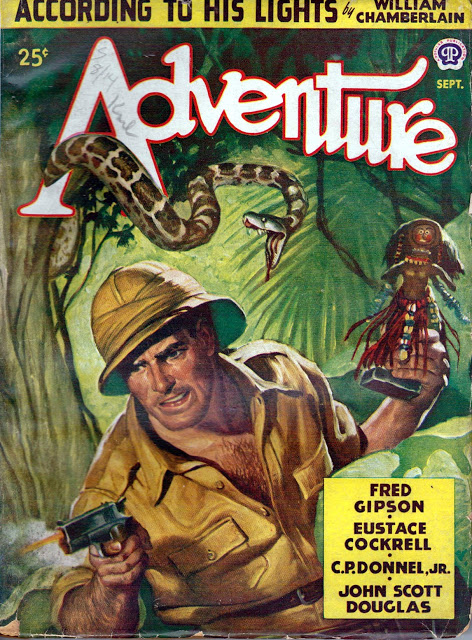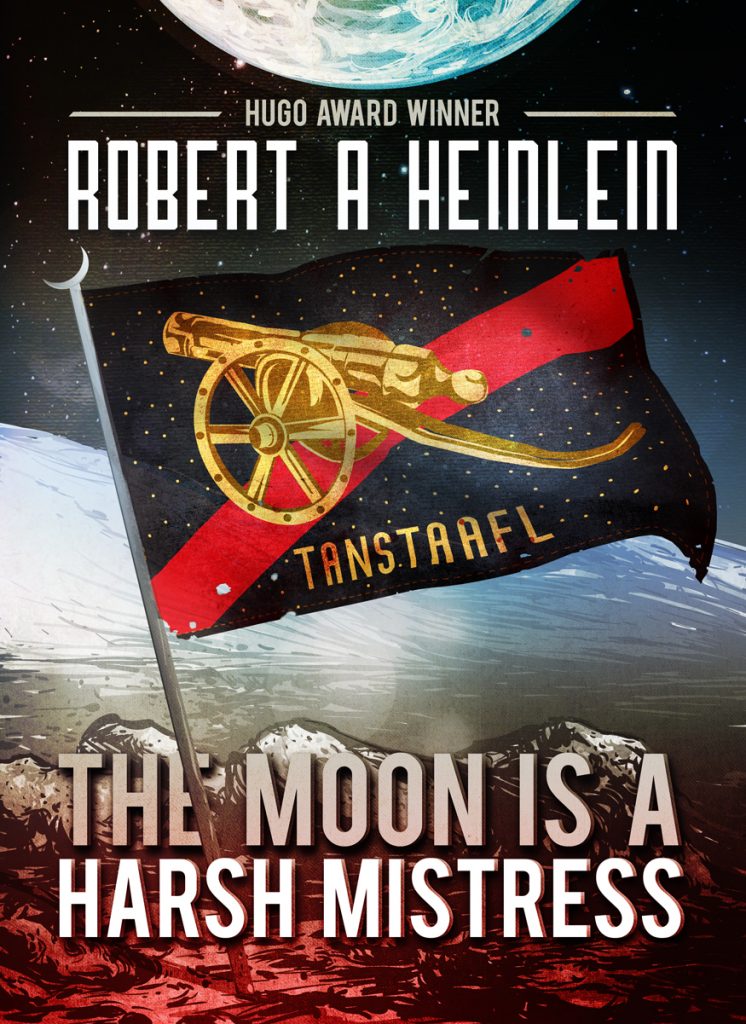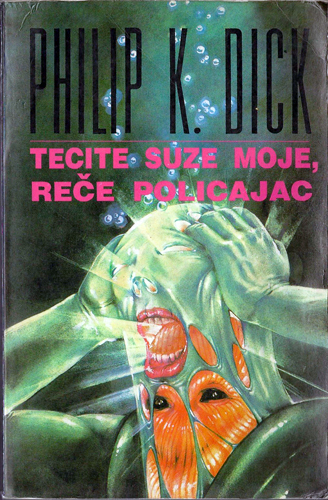
Strangely enough, this is close to what I picture “Adventure” as.
Originally, this article was meant to be different. I was going to examine two approaches to science fiction. One focusing more on action, adventure, and an exciting story, and the other on ideas about society, technology, and the future. Most stories feature both elements, but have a very clear focus preference. And yet, the more I considered it, the more I realized all the worthwhile Big Idea tales are also good Adventure stories. And most tellingly, even a profound, highly intellectual science fiction writer is capable of spinning a fine yarn that would hold its own in any early pulp magazine.
On the flip side, bad science fiction writers, whether they go for Big Ideas or not, are incapable of writing such “mere” entertainment. Thus, we can consider simple, honest adventure to be the very heart of what makes quality science fiction. You might well be unconvinced by this, so let’s look at some examples.
The Moon is a Harsh Mistress, Robert Anson Heinlein
One of my favorite science fiction books, it is replete with ideas about government, revolution, and even the nature of humanity itself. The book straddles the line between realism, idealism, and cynicism in a manner that is magical and unforgettable. In terms of Big Ideas, it’s fantastic.

Nowadays, advertising a Hugo Award would lower the book’s sales.
And yet, it’s also a wonderful adventure . The travails of three eccentric moon-dwellers and a supercomputer outwitting tyrannical governments on the moon and Earth is told with zest and humor. The characters are likable, the problems they encounter serious, and their solutions inspired and unique. Take away any ruminations about government, the human tendency to succumb to tyranny, or the sober ending, and you still have a great adventure tale.
And of course, Heinlein had initially made a successful career of exactly such fun stories, with few major ideas in them. Is there any deep thought in a Starman Jones or The Puppet Masters? No. But they’re both good stories, especially the latter. Later, Heinlein would inject more and more ideas into his books, beginning with an initially positive view of government and continuous human progress (Double Star or The Door Into Summer) and evolving from there. However, he had to learn to write a good adventure first! And that was still the backbone of all his future works.
Flow my Tears, the Policeman Said, Philip K Dick

This Serbian cover version is a solid attempt at conveying the book’s weirdness.
Surely, Dick’s weird dystopian madness doesn’t fit the mold? In this one, a massively popular talk show host wakes up one day and no one knows who he is. He also lacks any identification, a problem in the awful police state future he lives in, where anyone except the elite has a hellish existence.
Despite the book’s many strange elements, and one of the most bizarre, mind-melting endings I’ve read, it’s a good mystery-thriller at its core. All of the elements are there. A confused protagonist using his wits to survive situations alien to his regular lifestyle. A central, genuinely perplexing mystery he is trying to solve while on the run from pursuers. A string of encounters with a diverse, seedy array of characters, including movie stars, prostitutes, counterfeiters, and the police. All of them constantly trying to outwit one another, and playing this game at a high mental level.
Frankly, without this, the strangeness and surrealist ideas would be easily dismissed and nowhere near as interesting. It would have even seemed pathetic in the context of a poor adventure story, as we will later see.
The Left Hand of Darkness, Ursula Le Guin
I’ve reviewed this several times in my columns, but if nothing else, this book is a fine example for aspiring authors on what to avoid. There are some Big Ideas here about gender and government. And the world-building is very good. Unfortunately, all of that goes out the window because of how badly Le Guin failed at writing the adventure!
An emissary, Genly Ai, from a galactic federation wants the members of a cold, backwards planet to join it. Who is Genly, the main character? No one, as he lacks any personality. Do we know anything about his federation? No, and thus, we don’t care. In fact, what the hell does it matter whether this stupid planet joins them or not? The book never attempts to explain why it’s important.
Thus, we have no connection to the protagonist and his plight, and the stakes are effectively eliminated. And this is before we get into the slog of a story, presenting several staccato events without any verve or ingenuity. Genly gets imprisoned, without incident or intrigue. Genly escapes, without incident or anything noteworthy or neat about his plan. Aside from Genly there is one other significant character, and he has no personality, either. The rotten adventure at the center of the book turns everything else rotten, too.
A Wrinkle in Time, Madeleine L’Engle
Unlike Le Guin’s book, this one is an absolute disaster without even the sheen of world-building or any remotely interesting Big Idea. Yet, it’s a symptom of a problem in science-fiction writing because of how many books have aped its approach since its publication in 1962.
It’s a phenomenally stupid book that misuses the term “cytoplasm” and claims one can’t draw a four-dimensional object. (You can, or at least in the same manner you draw a three-dimensional object on a piece of paper, as I demonstrated to my fifth grade teacher) Furthermore, it’s a book for kids, a demographic that especially favors adventure over philosophy.
And yet, it focuses on Big Ideas as much as it does the events of the story itself. Without being able to write a solid adventure, the heart of science fiction, L’Engle compounds her problem by writing Big Ideas that are laughably wrong when they’re not simplistic tripe.
Now sure, L’Engle hit the jackpot when this pretentious, dull garbage became a staple of elementary school libraries and curricula. A pretense of sophistication mixed with a banal message is uniquely successful within that racket. However, the supply always vastly outnumbers the demand. She struck gold, but the 3,000 similar books in the past half century, some of which are significantly better, did not.
Don’t be like her imitators, aspiring writers. Work on mastering the fundamentals of a good adventure tale before you move on to any Big Idea.
This is also why so many here, myself included, revere the likes of Howard and Lovecraft. Both were intelligent, well-read men who had a plethora of interesting philosophical ideas (Lovecraft’s notions about the human condition are particularly fascinating and complex), but always chose to focus on the adventure. And this worked to their advantage.
They inspired countless generations of great science fiction authors, all of whom can write an entertaining story too, no matter how much they excel at Big Ideas.
One natural follow-up question to this is of course “does this apply to non-science fiction works?” In my view, no. Sure, there are writers with a reputation for profound, heady writing who were also master story-tellers. For instance, John Steinbeck had a fine sense of humor if one ever reads some of the stories in The Long Valley or the chapters in The Pastures of Heaven. And his first book, The Cup of Gold, is an excellent pirate tale featuring Captain Sir Henry Morgan.
However, when one considers a Dostoevsky or Faulkner, there is no exciting adventure inside their great works at all. Ergo, this is a quality unique to the science fiction genre.
I’d argue “The Puppet Masters” is a sneaky smart book.
But good article.
Although, I may need to challenge you to a duel to fight for the honor of the absolutely awesomazing “A Wrinkle in Time”.
I have to disagree with you regarding “The Left Hand Of Darkness”. First because I think that Genly Ai is a very real character, and secondly because I thought that the escape from the Communal Farm and subsequent crossing of the Gobrin Ice is survival adventure at its finest.
Very true. I actually have a good example from another medium.
Halo:Combat Evolved
Sure it might be a boots on the ground military shooter, however the way bungie set the narrative was genius. Yes you might be fighting off space aliens but there is always the bigger story in the background.
Who were the builders of Halo, the forerunners? What is it’s purpose? Why were the Covenant so desperate to stop you from landing on the Ring?
The slow narrative pace to the eventual discovery of why Halo was built was one of the greatest moments of storytelling in gaming.
Sure I will agree as a novel would fall apart (see Halo: The Flood) but for its medium I think Halo should be acknowledged as one of the greatest Science Fiction stories ever told.
As for influence I honestly think Halo has had a far reaching influence on people’s perception on science fiction more than any other piece of fiction in the last twenty years.
Sorry if you guys just wanted novels but as soon as I read the article my mind jumped to Halo.
“Entertainment is fiction’s purpose.”
— Edgar Rice Burroughs
Any fiction writers putting some OTHER objective before entertainment are prostituting their Muse. They should be writing op-eds and tracts instead.